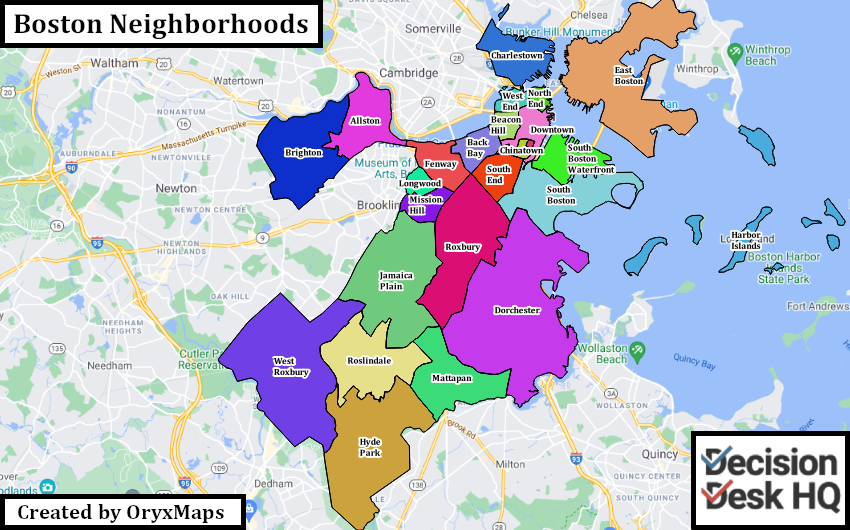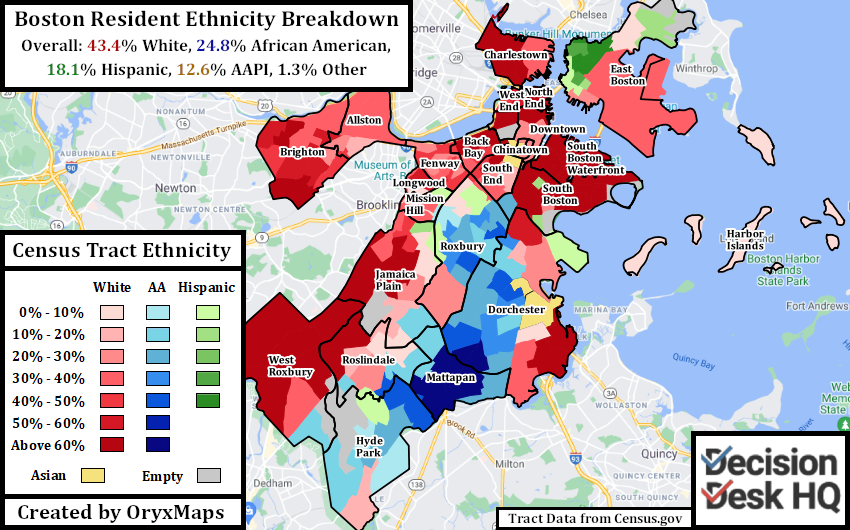
Boston votes on September 14th in the first of two elections to choose the city’s next mayor. Voters elect the mayor through a nonpartisan “top-two primary” system. In this system all candidates appear on the September primary ballot, and then the top two candidates advance to a runoff in November.
Former mayor Marty Walsh resigned from his position to join President Biden’s administration in March 2021. City Council President Kim Janey became the acting mayor and is now running for a full term. Decision Desk Headquarters previously examined Acting Mayor Janey’s and her six challenger’s campaigns in our August article. There were two main trends: high uncertainty from the large number of uncommitted voters, and Acting Mayor Janey enjoyed the advantages of incumbency. These trends have now reversed. Undecided voters appear to have broken in favor of City Councilor Michelle Wu’s campaign and increasing coverage boosted the rest of the competition. Janey no longer is guaranteed a runoff position.
State of the Race
Acting Mayor Janey’s three primary opponents are City Councilors Michelle Wu, Annissa Essaibi George and Andrea Campbell. All four are registered Democrats and all identify as progressives on specific issues – though the nonpartisan format means their affiliations do not appear on the ballot.
Every campaign underwent developments since our previous article. The candidates now have ads on the airwaves. Each major contender spent more than $500K on August TV advertising. The candidates cordially debated each other at a local forum on Wednesday September 8.
Boston is going through a fourth wave of Coronavirus infections. This prompted Michelle Wu to desire citywide vaccine passports. In early August, Janey compared vaccine passports to slavery-era freedom papers and birtherism and, though she regretted and quickly walked back these comments, her opposition to vaccine passports remains firm. Campbell supports vaccine and mask requirements, even if the state does not mandate them, and Annissa Essaibi George opposes enforcing a mandate.
Acting Mayor Janey pushed ahead with plans to reopen city public schools despite fears of contagion. Her administration provided emergency funds to accommodate the changed environment, such as outdoor tents for safe outdoor meals and on-school testing, and alleviated a threatened school bus driver strike before classes reopened. She restored the city’s eviction moratorium which drew criticism from Essaibi George.
Endorsements have flowed into the campaigns as election day draws near. Janey slowly amassed support from Boston’s African American and Hispanic groups, including local leaders, minority-dominated unions, and former mayoral candidate, Jon Santiago. Wu also received a constant stream of political endorsements and this is partially responsible for her surge in positive local media coverage. Wu’s recent endorsees include prominent downtown Boston State Senator Aaron Michlewitz, grassroots Democratic Party organizations, and Suffolk County (Boston) Sheriff Steven Tompkins. Andrea Campbell and Essaibi George have done less to cultivate the support of local leaders, but Campbell did notably win the support of The Boston Globe.
Field of Play
The most recent and highest quality poll of the mayoral race is from Suffolk University. It has Michelle Wu leading the field with 31% of voters. The other three candidates are neck-and-neck at 20%, 19%, and 18% respectively. This ranking affected the recent debate dynamics with Wu relaxing on the sidelines as Janey, Essaibi George, and Campbell contended for the second runoff slot.

Campaign donation data hints at how city voters may break, unsurprisingly along traditional demographic lines. Michelle Wu is running with support from Massachusetts Senator Elizabeth Warren and with the support of progressive small donor networks, so she has the most unique donations overall. These donors are concentrated in the north of the city, in Jamaica Plain, and in downtown – all areas with younger or Whiter populations than the city overall. Kim Janey and Andrea Campbell draw their support from the diverse southern neighborhoods including Roxbury and Dorchester. Annissa Essaibi George has a coalition of the city’s few conservatives and wealthy White Democrats, both of whom are clustered in West Roxbury and coastal South Boston.
Michelle Wu’s runoff position might be secure, but the tight race for the second slot means small differences in turnout could change who advances to the second round. Whoever advances to the runoff with Wu though may have a greater potential to consolidate more than 50% of the vote, even though Wu is expected to top the September primary. Janey’s and Campbell’s bases overlap and a majority of their support should transfer from one to the other no matter which advances. Essaibi George’s support network opposes the vocally progressive Wu and is expected to support her eventual rival. The November runoff for Boston’s next mayor will be a competitive and likely close contest.
Ben Lefkowitz (@OryxMaps) is a Contributor to Decision Desk HQ.